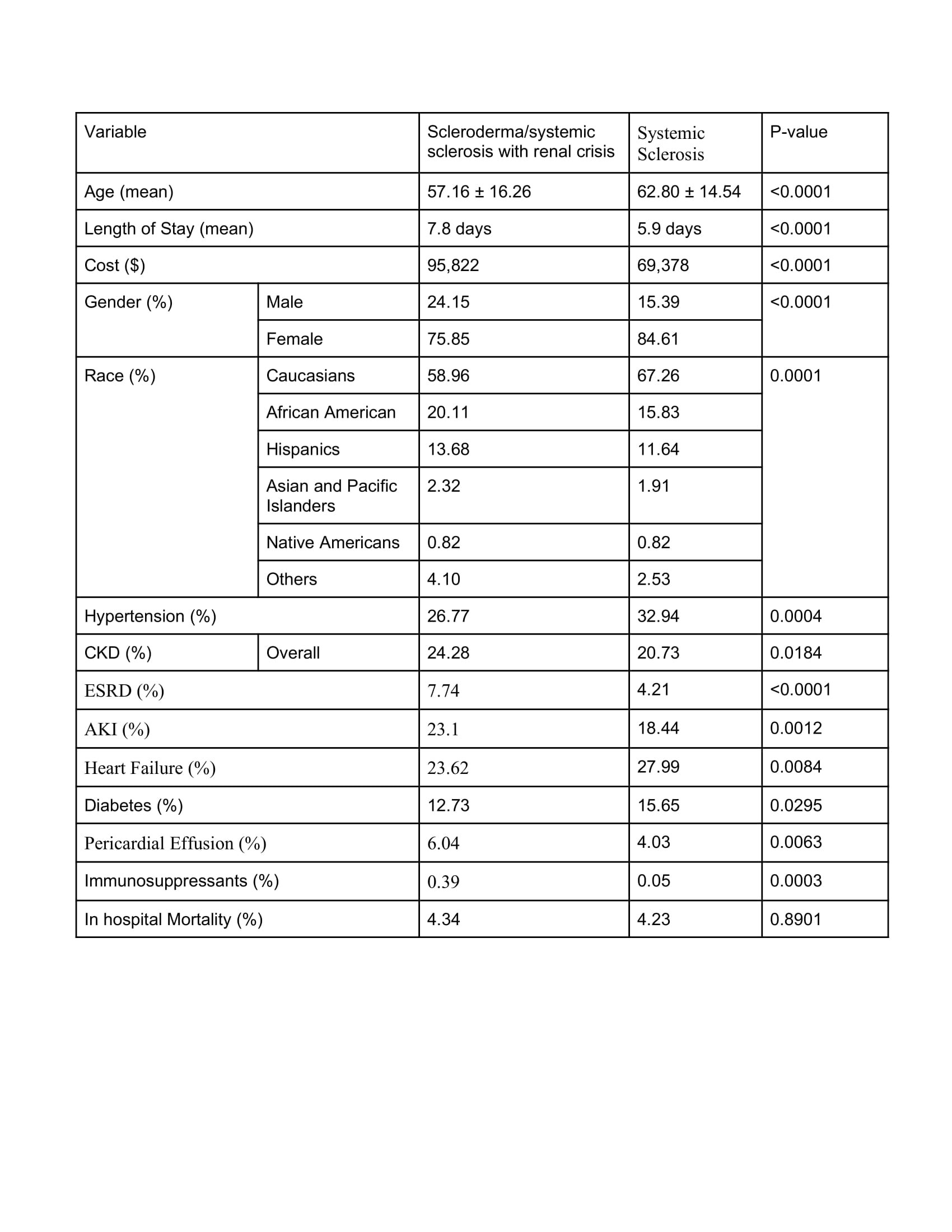Session Information
Session Type: Poster Session B
Session Time: 9:00AM-10:30AM
Background/Purpose: Scleroderma renal crisis is a rare complication of Systemic Sclerosis (SSc) with high mortality and morbidity. Most patients present with acute symptomatic increase in blood pressure, renal failure in the form of oliguria, and a rise in creatinine levels along with thrombosis and microangiopathy. We aim to identify some underlying risk factors, patient characteristics as well as discuss the cost of care and burden on the health system in this group of patients.
Methods:
We used the Nationwide Inpatient Sample database (years 2016-2018) and extracted all patients with SSc using validated International Classification of Disease (ICD) codes. Further, we divided the population based on the presence of the Scleroderma renal crisis and analyzed the demographics, comorbidities, cost of hospitalization, and length of stays. Data was analyzed using statistical analysis system 9.4 software.
Results: We identified a total of 18,204 cases of SSc between 2016-2018. Out of those, 762 (4.19%) had Scleroderma renal crisis. The mean age for patients with SSc without renal crisis was 62.80 ± 14.54 and the mean age for cases with scleroderma renal crisis was 57.16 ± 16.26. Length of stay with scleroderma renal crisis was much higher at 7.8 days compared to 5.9 days for cases without the crisis (P < 0.0001). The cost of hospitalization was $95,822 for scleroderma renal crisis patients compared to $69,378 for admissions without renal crisis (p< 0.0001). Overall, Scleroderma was more common in females as compared to males, but males presented more commonly with renal crisis in the presence of disease with a p-value of < 0.0001. Caucasians were the most affected racial demographic (58.9 in renal crisis patients and 67.2 in non-crisis patients), followed by African Americans (20.11 VS 15.6), Hispanics (13.8 VS 11.6), Asian, Pacific Islanders(2.32 VS 1.91), and Native Americans(0.82). Amongst the predisposing risk factors, including hypertension, chronic kidney disease and Diabetes Mellitus, no statistically significant increase in prevalence of renal crisis was noted. While patients with underlying risk factors of ESRD on hemodialysis, chronic immunosuppression, and underlying heart failure were found to have a higher prevalence of scleroderma renal crisis ( p values < 0.05). There was no difference in in-hospital mortality between the 2 groups.
Conclusion: Our study showed that Scleroderma renal crisis is associated with a higher length of stay and cost of hospitalization than those with SSc alone, leading to a significant burden on health care indicating the need for better therapies. While SSc is more common in females as compared to males, males have a higher propensity to develop renal crisis. A significantly high number of these cases are seen in the Caucasian population. Patients with underlying end-stage renal disease and heart failure were found to have a higher risk of developing renal crisis. Proactive measures such as close monitoring of blood pressure, limiting glucocorticoid use, and addressing the presence of active inflammation in these subset of patients with Scleroderma may prevent the development of renal crisis and hence prevent worse outcomes in terms of patient morbidity.
To cite this abstract in AMA style:
Hussain A, Khandwala P, Moldovan T. Disease Prevalence and Patient Characteristics in Patients with and Without Scleroderma Renal Crisis – A National US-based Inpatient Comparison Study [abstract]. Arthritis Rheumatol. 2022; 74 (suppl 9). https://acrabstracts.org/abstract/disease-prevalence-and-patient-characteristics-in-patients-with-and-without-scleroderma-renal-crisis-a-national-us-based-inpatient-comparison-study/. Accessed .« Back to ACR Convergence 2022
ACR Meeting Abstracts - https://acrabstracts.org/abstract/disease-prevalence-and-patient-characteristics-in-patients-with-and-without-scleroderma-renal-crisis-a-national-us-based-inpatient-comparison-study/

